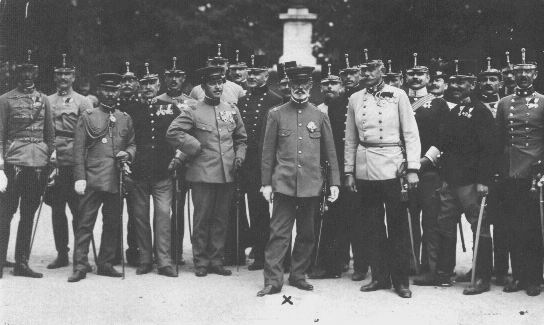General Nogi's suicide in 1912.
More on Nogi here,the victor of Port Arthur:At the beginning of the Taisho period, on the day of Emperor Meiji's funeral, General Nogi and his wife closed the door to their second-floor living room and prepared to end their lives. He had removed his uniform and was clad in white undergarments; she wore black funeral attire. They bowed to portraits of Meiji and of their two sons, killed in the Russo-Japanese War. While the funeral bells tolled, they proceeded to commit ritual suicide. Mrs. Nogi acted first; he assisted, plunging a dagger into her neck, and then he disemboweled himself with a sword. The departed hero of the Russo-Japanese War left behind ten private notes and a single death poem. (The writing of waka death poems was another practice from Japanese antiquity that was revised in the nineteenth century.) In one note he apologized for his action to four family members, including his wife, and acknowledged having contemplated suicide ever since losing his regimental flag in the war of 1877; he also mentioned his aging and the loss of his sons. In another note, to a military doctor, he bequeathed his body to medical use....
Nogi's death poem, intended for public consumption, told the nation that he was following his lord into death--a practice known as junshi that even the Tokugawa shogunate had considered barbaric and outlawed "as antiquated in 1663." Conservative intellectuals ... interpreted Nogi's suicide as a signal act of samurai loyalty, pregnant with positive lessons for the nation, and for its armed forces. Nantenbo, Nogi's Zen master, was so enthralled by the majesty of his pupil's action that he sent a three-word congratulatory telegram to the funeral: "Banzai, banzai, banzai." The Asahi shinbun, however, editorially criticized those who called for the establishment of a new morality by reviving bushido, and asserted that Nogi's harmful action could teach the nation nothing. Kiryu Yuyu, a writer for the Shinano Mainichi shinbun, went further, not only decrying Nogi's death as "thoughtless" and "meaningless" but warning presciently that "to comprehend death as loyalty" was a mistaken ethical idea that could only "end up encouraging great crimes in international relations."
When informed of "Schoolmaster" Nogi's death by the chamberlain in charge of supervising his education, Hirohito alone of his three brothers was reportedly overcome with emotion: Tears welled up in his eyes, and he could hardly speak. Doubtless he was too young really to understand the general's action, let alone the harmful effect that his anachronistic morality of bushido might have had on the nation. But as Hirohito remarked late in life to an American reporter, Nogi had a lasting influence on him, instilling precepts of frugality and stoic virtues of endurance and dignity to which Hirohito never failed to adhere. The brave Nogi was to Hirohito a giver of orders who meant what he said and was willing to lay down his life for his master. Hirohito not only identified with Nogi, he also derived from him the conviction that strong resolve could compensate to some extent for physical deficiencies. In Hirohito's imaginings, Nogi was to be emulated almost as much as his other hero, Meiji.
http://www.ndl.go.jp/portrait/e/datas/160.html?c=0


